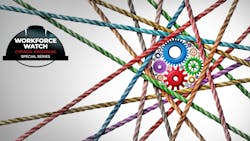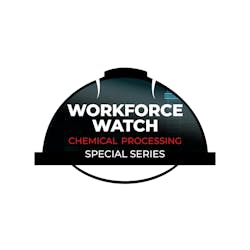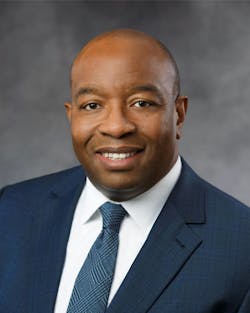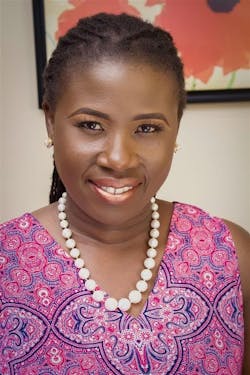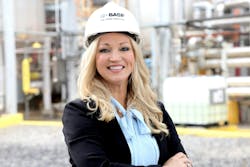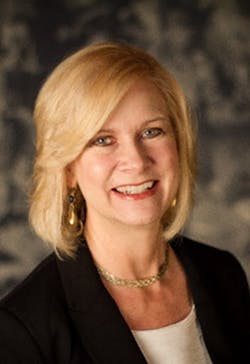“I grew up in a place where there were drive-by shootings — I have bullet holes in my childhood home,” says Dennis Banks, vice president of Syncrude maintenance at Suncor Energy Inc., who grew up in Detroit, went to college in Louisiana and now resides in Fort McMurray, Alberta, Canada. “Some people freeze in the face of chaotic situations. I don't view [many] situations as perilous. So, I'm able to maintain calm and composure in the face of a lot of adversity and chaos because of what I went through growing up. I view things like incident management and unfortunate accidents differently. ”
That is what having a diverse workforce brings to the table: different perspectives, different strengths and different energy.
“I think if you look at the stories around the tables that I've sat at, each one brings something different from their background,” Banks says. “And I think that's what leads to better decision-making and better outcomes.”
While diversity helps foster new ideas that a more homogenous team might never stumble upon, DEI (diversity, equity and inclusion) programs face backlash. Whether from recent legal actions—the Supreme Court’s recoil of affirmative action in college admissions—or social reaction pressuring some companies to abandon their efforts to be inclusive, there is a need to prove these programs’ worth.
As Jonathan Katz pointed out in the first installment of Chemical Processing’s five-part series on the chemical industry workforce, "Chemical Industry Workforce: Shaping Tomorrow's Talent," skilled workers are hard to come by. Widening the talent pool by attracting underrepresented demographics is just one way DEI programs can earn their keep. Suncor and BASF shed light on other quantifiable reasons to continue championing these programs.
Diversity Backlash
Diversity gets a bad rap because it’s misunderstood. It’s often initially perceived through visible characteristics like gender or race. However, Banks says he sees diversity as a spectrum encompassing backgrounds, thoughts, opinions and ways of working and being.
Fostering cognitive diversity—the inclusion of individuals with varied thinking styles and perspectives—is a key aspect. Moreover, it safeguards against groupthink.
To be sure, World Economic Forum research shows that companies with above-average diversity scores drive 45% average revenue from innovation, while companies with below-average diversity scores drive only 26%.
Another reason diversity programs matter is that they stem alienation. Suncor has several inclusion networks in place to help its workers not only better see themselves in the whole of the company but also shed the need to play a role during work hours. Banks is the executive sponsor for the company’s Mosaic program (Suncor’s black employee network), which was officially launched in 2022 but, like many similar programs, got its start in 2020 after the George Floyd verdict.
“We had already chartered Journeys, which is our Indigenous employee network. We were just chartering Prism, which is our gay, trans community network. And we were seeing the benefits of those,” says Banks. “At the heels of the George Floyd incident, many of the black employees felt like they wanted to have a community. They wanted to be heard, they wanted to talk.”
Suncor’s other workplace inclusion networks are Women Engage and enABLE, which empowers persons with disabilities. The space that these networks provide helps spur innovation by eliminating the need to fit a certain mold.
“Do you know how exhausting it is to play a role?” asks Banks. “I have a cousin who's an actor, he's drained at the end of a performance because he has to put on this persona that's different from his own and go and perform. Think about that for employees who have to leave home and put on this costume, this disguise and wear it for eight hours a day, 40 hours a week. How exhausting that is. And how that energy that could be better spent on the work, on the contribution, on the output is then divided between all these different things that don't contribute to the success of the individual or the organization.”
Illustrating this point, the Suncor website features a story of one of Mosaic’s members, Pele Williams, manager for digital and information technology at Suncor.
“I studied computer engineering in Nigeria, worked as a network engineer, but faced stereotypes and limitations. I’d show up at a work site, and they’d ask, ‘Where is the engineer?’ I decided to break through those barriers,” Williams explains.
“Now, managing the digital portfolio for our refineries, I apply my knowledge of digital architecture and IT-business translation to the delivery and operations of digital solutions,” says Williams. “It’s about transforming ideas into reality, a journey that started with breaking through stereotypes.”
From Perk to Must-Have
Pointing to research from Deloitte’s 2024 Gen Z and Millennial Survey: Living and working with purpose in a transforming world, the publication Human Resources Director notes the majority – 69% -- of millennial and Gen Z employees state that they are more likely to stay for five or more years at a company with a diverse workforce. Glassdoor research notes that 76% of employees cite DEI in strategy as “non-negotiable.”
For Christen Campbell, BASF’s North America energy and sustainable technologies and site development director, a strong DEI program put her on the pathway to success. She started her career at another company but had an opportunity to interview for BASF. “I talked to people that I trusted and they said, ‘Wow, the reputation that BASF has for career development, you absolutely have to go for it.’ And so I joined the company with that in mind,” she says.
In her first five years at BASF, she was in a process safety management role and felt like she’d stay in that position for a while until a mentor encouraged her to try a different role. Around that time, BASF introduced its FLAME program—Female Leaders Advancing Manufacturing Excellence.
“It was really that boost of the FLAME program that really propelled me into my first manager role,” says Campbell. “I went from environmental health and safety to procurement as a manager, not even really knowing fully what procurement was. It was the trust in my leadership capabilities and the encouragement from the FLAME program that helped me to take that risk and build that leadership capability.”
Striving for gender equality has its advantages. A study published in Harvard Business Review by Jack Zenger and Joseph Folkman found that women outscored men on 17 of the 19 capabilities that differentiate excellent leaders from average or poor ones. These capabilities include relationship-building, collaboration and communication.
Susan Emmerich, manufacturing talent programs implementation manager, BASF North America, points out other benefits to gender diversity.
At BASF’s Geismar, Louisiana, site there were several female operators who spoke up about a particular task that they were having difficulty accomplishing, and that led to the tasks being reevaluated, Emmerich says.
“It turned out that those tasks were actually difficult for everyone and were really unrealistic for just one person to do alone without assistance from tools,” she explains.
The outcome: Better and appropriate tools were created. This feedback was integrated into the operations, and both male and female operators benefitted from it.
“That's a clear-cut example of when you have a varied workforce, a diverse workforce with people that come from different backgrounds, different experiences, have different ways of looking at things, particularly problems for troubleshooting, it really gives us a comparative advantage for innovation,” Emmerich says.
She points out that FLAME came about because the manufacturing leaders at BASF wanted to support women in manufacturing roles -- particularly the frontline roles. Under FLAME, there are two programs. There's a three-year program called Ignite Your Potential, which is for early in career, and then there's a one-year mid-career program, Lighting the Way.
“The other reason why the FLAME program came about is we want to retain women in manufacturing,” says Emmerich. “If we're able to develop them and then we're able to promote them, we're able to retain them. We just did the most recent KPI on this, and we've retained 87% of our FLAME grads in manufacturing roles. It's a real success story.”
A Cloverpop study conducted in the UK examined 600 business decisions across various industries. Two hundred teams were involved in those decisions. Research shows a direct link between inclusive decision-making and better business performance: Diverse teams make better business decisions up to 87% of the time; teams that follow an inclusive process make decisions two times faster with half the meetings; and decisions made and executed by diverse teams delivered 60% better results.
Campbell offers another example of how having a diverse team impacts the bottom line. She notes she was part of a global procurement team whose goal was to enhance business profitability. The team consisted of professionals from various backgrounds and countries across 20 sites working across time zones and cultures.
“At the end of the day, we delivered one of the most innovative and successful offerings back to the business, saving almost 80 million euros every year, which is incredible across those sites,” says Campbell. “This approach is now being replicated -- bringing people together across countries, across sites, across different backgrounds. It's not even necessarily labeled as a diversity project, but it becomes a diverse team. And so that's really where you see that organic ability for people to come together with their different strengths and shine in coming together with creativity.”
Suncor’s Banks also notes the benefits of having a diverse field of team members to choose from without touting it as diversity programs for the sake of appearance.
“I've had conversations with our CEO Rich Kruger; this isn't something that he talks about at investor calls and wants to parade it around,” says Banks. “For him, it's about the results and the performance of the organization. This is a way to differentiate us from others, make us the most desirable employer and help us drive results and sustain results in a positive direction.”
Addressing DEI Challenges
Banks points out that some companies have gone too far in their DEI efforts and are missing the point, which is not to check a box to make shareholders and the public happy.
“They have dozens of employee resource groups, and they want to parade them around. It truly just becomes kind of insulting,” he says. “I come back to, okay, so what are you doing with it? Where are the results?”
BASF’s Emmerich adds that it takes time and resources to develop worthwhile programs. It takes two-way communication to prove to your workforce what diversity and inclusion really mean, how it benefits them and how it benefits the entire company to work together with people from different backgrounds, perspectives, experiences, degrees, and non-degrees.
“At the end of the day, we're not a social organization, this is not a philanthropic organization. We're not a not-for-profit,” says Banks. “We're here to do a job. We're in a business that's very competitive. I believe a competitive edge is having a workforce that's on fire, that works together, that isn't hampered by stereotypes and other hurdles that prevent people from working together.”
Editor's Note: Stay tuned for the next installment in the Chemical Industry Workforce: Shaping Tomorrow's Talent series where we look at the latest training strategies. And listen to the entire interview with Dennis Banks via the podcast below.
Defining DEI
Dennis Banks, vice president of Syncrude Maintenance at Suncor Energy Inc., offers his definition of DEI. To hear the full conversation with Banks, listen to this podcast.
“I liken diversity to music. If music consisted of a single note, it would be monotonous and uninteresting. What makes music rich is the combination of different notes, melodies and sounds.
Equity and inclusion are more specific concepts. Equity, to me, is about ensuring fair opportunities for everyone, even if that means providing different levels of support. I envision it like the image of children of various heights trying to watch a baseball game over a fence. By providing stepped platforms, each child can see over the fence despite their different heights. The fence remains unchanged, but accommodations are made to create parity.
Inclusivity, on the other hand, is more dependent on group dynamics and culture. It's about creating an environment where everyone feels they can contribute authentically, regardless of their background or interests. It requires a collective commitment to ensuring that all voices are heard and valued, fostering a sense of psychological safety within the group.
In essence, while diversity represents the range of differences among individuals, equity focuses on fair access to opportunities, and inclusion centers on creating a welcoming environment where all can participate fully.”
About the Author
Traci Purdum
Editor-in-Chief
Traci Purdum, an award-winning business journalist with extensive experience covering manufacturing and management issues, is a graduate of the Kent State University School of Journalism and Mass Communication, Kent, Ohio, and an alumnus of the Wharton Seminar for Business Journalists, Wharton School of Business, University of Pennsylvania, Philadelphia.
